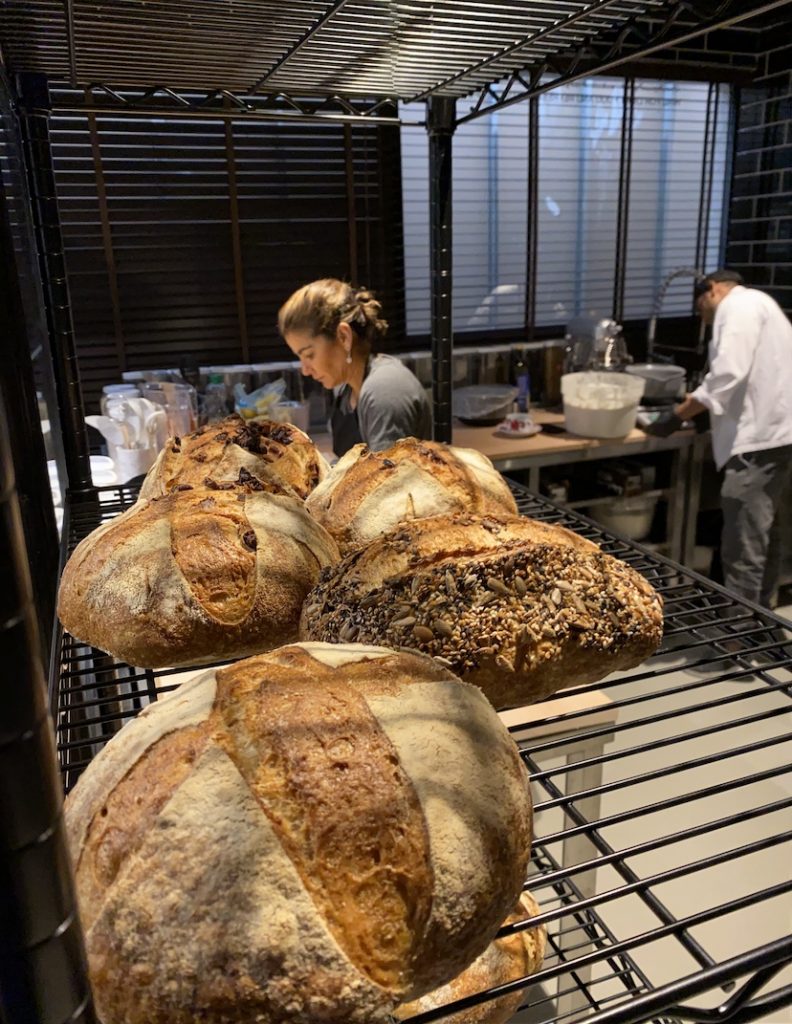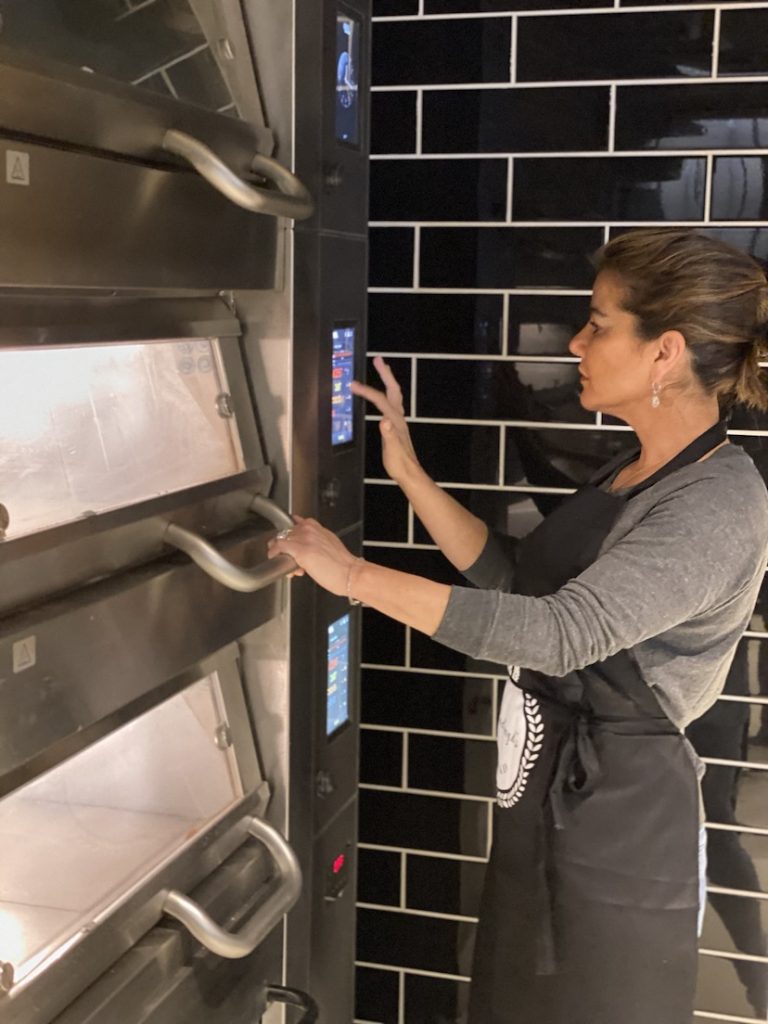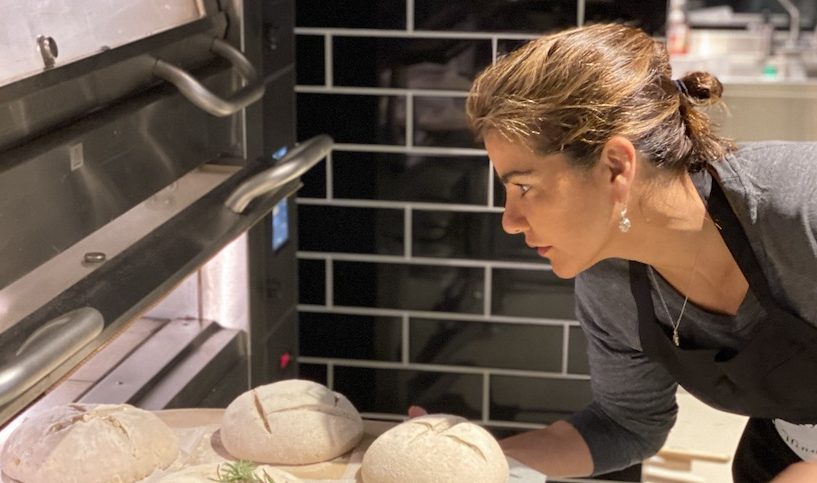Bread is ubiquitous. Every culture and people have their chosen loaf that is present at their table. And while all bakers in general are part scientists and part artists, a select few have decided to focus on making artisanal bread. Hind Akil, bread-baker extraordinaire and owner of Hindough tells us how artisanal sourdough bread became her chosen path.
When did you start baking in general?
I never really saw myself in the kitchen, and was not really into cooking much, let alone baking. However, I always appreciated good food and especially good bread. One day I came across an article in Bon Appétit magazine about baking sourdough bread in a dutch oven, which is basically a cast iron pot. The idea was appealing to me as I always thought a dutch oven was meant for stews and slow cooking. I thought how cool would it be not only to bake my own bread from scratch- but in a dutch oven! I decided to try it out, and that was my cue to getting into the kitchen and taking a stab at baking my first loaf.
The recipe called for a ‘starter,’ which is basically naturally fermented yeast. But I had no idea what that was. So I called up a friend who had been in the baking industry for a while and asked her to teach me how to make a sourdough starter of my own. I had no idea how intense the bread making process was, and that a starter needed weeks to make, not to mention the time it took to actually bake sourdough, which could take up to 48 hours. But I was hooked; and so the quest began, and I stuck to it.
You mostly focus on sourdough bread, why?
Spending all my summers in San Francisco from a very young age, my mom used to put us in the car and take us to the farmers market, sourdough was everywhere… We would buy two baguettes for the ride home, and another four for dinner. I knew the taste so well, it was something that resonated with me as a child. So, coming back to making it and smelling it, brought back a lot of great childhood memories. The crazy thing about all this is I don’t even eat bread! I have always had lots of gut issues and gluten intolerances with regular bread. That made my sourdough quest so much more relevant since it’s much easier on the gut given the natural fermentation process actually breaks down the gluten to up to 98%, not to mention the probiotic effects it has on the gut. That made sourdough much easier to consume given my intolerances to gluten. Sourdough is also very low on the Glycemic Index, (GI) which is basically a way to rank carbohydrates in foods according to how they effect blood glucose levels. Carbohydrates with a low GI level are more slowly digested absorbed and metabolized and cause a lower and slower surge in blood sugar and insulin levels. This also makes sourdough a preferable choice for diabetics. So I thought to myself why not explore this gut friendly and diabetic friendly option further and make it more accessible to all.

What is your baking process like?
I definitely read a lot and try a lot of recipes, but at the end of the day, you have to tweak everything to your individualized standard. You might look up a recipe online or in a cookbook for example and it may work perfectly for someone living in France but in Kuwait, that recipe Is likely to yield a completely different product. This is because of the fact that sourdough is so sensitive to external factors and responds differently to such things as variant temperatures and humidity- all of which can affect the outcome of the bread and can turn it into something completely different!

How does baking make you feel?
I feel at peace when I bake. It’s a very delicate process, you have to respect the dough in order for the dough to respect you back. It’s a very meditative process for me and has taught me a lot about patience.

What makes a bread “artisanal”?
Well, artisan breads go a long way back. An artisanal baker is someone who is skilled in an art, so their craftsmanship in baking is of the highest quality. It also means that there is no mass production; It has a shorter shelf life, is hand made in smaller quantities to ensure its freshness. Sourdough bread is very simple in that it’s made from just three simple ingredients; flour, salt and water. Its traditional methods and simplicity of ingredients is what makes it artisanal.
How do you develop new recipes? How do you decide to add a new item to your offerings?
I learn a basic recipe then I put in inclusions that I love. One of my favorite pairings with sourdough is caraway seeds, another is olives. It’s really about trial and error, some recipes are a hit while others don’t quite make it, and that’s ok. I also try to cater to local tastes and can usually tell quite quickly if something is popular or not. The zaatar bagel, for example, is definitely a crowd pleaser but nothing I’ve ever picked up at a local bakery in New York City.

What does your testing process look like? Do you ask other people to taste it?
I have four kids and a husband – all of them love sourdough! I developed the taste for it spending my summers in the Bay Area, the land of sourdough, and my kids also developed this same taste spending their summers in New York City. They all have a pretty complex palette and have a great sense of quality bread. You can say I have some pretty tough critics in the house- I often hear “it’s not sour enough”.
What is your favorite way to enjoy a freshly baked loaf?
Although I’m gluten intolerant, I can still eat a little bit of sourdough and it doesn’t bother me like regular bread does. I’ve recently launched a gluten free line which has been received very well. I love a hearty dense loaf like rye or pumpernickel made with caraway seeds. I love it simply toasted with my coffee in the morning, or with smoked salmon and caviar!
What is your favorite recipe?
I think a favorite of mine is our miche loaf, which is also a dense bread like rye. It’s nutty and flavorful and is made with a combination of whole wheat, rye and spelt flours. We also use a specific rye starter with our miche which is what gives it that sour nutty wholesome flavor.
What’s a bread secret that everyone needs to know?
Don’t rush the dough, let it speak to you. A recipe will usually need to be tweaked as there are always factors that you won’t be able to fully control while baking. All these variants such as temperature and humidity can effect your dough, so when it’s ready it will tell you. When I first started I always thought you had to follow a recipe word for word, later I came to realize that it wasn’t the case at all.
What are your future plans?
I live in the moment, I don’t really make plans. Who knows, maybe I’ll go into croissants next or sandwiches, but right now I’m happy where I am. There is so much to learn and explore, I’d like to remain here for a while. I’ve also collaborated with a local Kuwaiti farm – Sadeer Farms where we have been sowing our own wheat, milling it and using it as the flour for our sourdough. It’s been so great living the process from end to end: seeing a seed turn into wheat, cleaning the wheat, then milling it and baking with it to create sourdough. It’s satisfying and feels so great to know that the seed you planted is the loaf you are eating today, literally from farm to table.
You can order Hindoughs bread on iklikl.com, or instagram @hindoughs. Featured image courtesy of Hind Akil.








